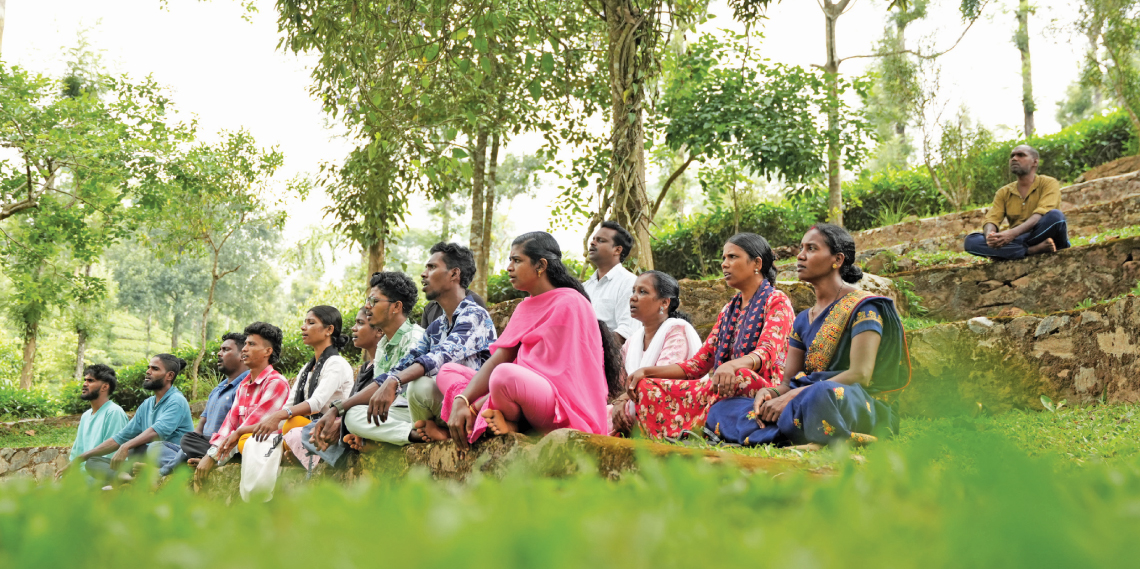Song sung true
Tribal musicians are at the heart of a remarkable fellowship programme in Kerala that celebrates their culture and heritage
Surag Sankaran is done with being a daily-wage labourer. A pathway once unclear has opened up before him and the 23-year-old native of Panavally village in Kerala’s Wayanad district is hitting the high notes. “I’m living my dream; this is going to change my life,” he says.
Mr Sankaran’s upbeat outlook about what the future holds is down to being part of the Earthlore Fellowship, a year-long pilot programme designed to promote traditional tribal music and hone the talent of tribal musicians. Music is the centrepiece here and there’s space as well for training in theatre, soft skills and more in what is an exhilarating blend of collaborative learning and sharing.
Set up in April 2025 by the Archival and Research Project (ARPO), a Kochi-based nonprofit — and with steadfast support from the Tata Trusts to count on — the fellowship has blossomed even as it has evolved. In its fold are 18 tribals from Wayanad and neighbouring Coorg district in Karnataka, men and women in about equal numbers and ranging in age from 18 to 38. Also in the pool are two non-tribal musicians.
For the tribals in the group, music was previously more of a passion than a craft formally studied. That did not make them lesser musicians. Homemakers, students, autorickshaw drivers and daily wagers like Mr Sankaran among them, they are naturals in matters of music, steeped in stories of tribal culture and heritage, ever willing to celebrate the community spirit through song and dance.
Absorbing the finer facets of music has been a boon for the tribal fellows, many of whom perform with local music troupes. A singer and instrumentalist from the Kattunayakan tribal community, Mr Sankaran took a while to jell with the programme and the people in it. “It was a bit difficult at first for me but then I began to bond with the other fellows. Music was the glue,” he says. “With our songs and our stories, it feels like a family now.”
A better beat
For Aparna Raj, a 23-year-old graduate student from Sulthan Bathery in Wayanad, the fellowship has been a revelation. “I’m a singer in a 25-member troupe but I never really thought much about tempo, rhythm or pitch while performing. I know better now,” she says.
Hailing from the Paniya tribal community, Ms Raj came into the programme not knowing what exactly was in store. “I thought we would learn about the songs and instruments of different tribal communities, but this has been something else, something more,” she says. “There’s such a sense of togetherness.”
The programme offers comprehensive training by domain experts in traditional and contemporary music, with a range of elements coming into the frame: vocal techniques, percussion and string instruments, songwriting, composition and orchestration. ‘Training’ may be a misnomer in the context. What the fellowship has done best is fashion a creative communion — between tribals and non-tribals, learners and instructors — in tribal music and tribal lore.
This cross-cultural exchange is central to an effort where camaraderie has fostered a feeling of belonging in an environment of equals. The programme itself is structured to make that possible. There are 12-day monthly sessions when all the fellows come together at Mananthavady, their base in Wayanad, and regular monitoring and feedback mechanisms.
Beyond the musical, the Fellowship includes an array of components: acting, soft skills, language proficiency, sociopolitical awareness and an understanding of the music industry. Not least, it provides a monthly stipend of ₹15,000, serious money for quite a few of the fellows.
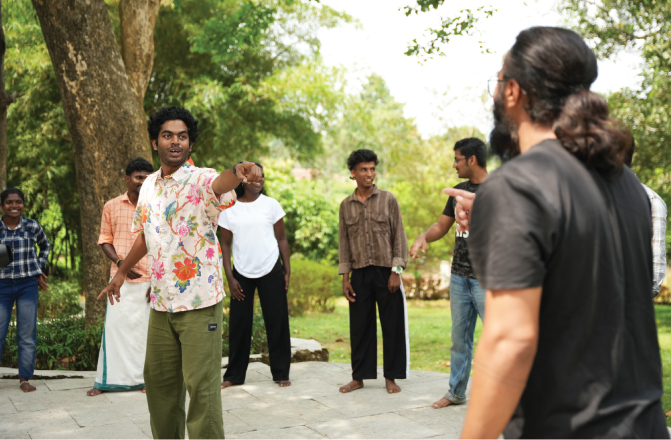
The secret sauce
What does the skill of acting have to do with being a better musician? More than a bit, it seems, especially when they can be combined to create something superior. Incorporating theatre and acting in its music-focused repertoire has done just that for folks in the Earthlore Fellowship initiative.
Bringing acting into the blend has been an enabler for the programme in multiple ways, enhancing the stage presence of the fellows, building their self-confidence and nurturing in them the ability to narrate stories of their culture and traditions to telling effect.
That would not have come as a surprise to Ajitlal Shivlal, the Kochi-based actor and theatre person tasked with conveying to the fellows what acting is about. “The talent of these tribal musicians is obvious,” he says. “All I’ve tried to do is see what comes from them and structure that to their advantage.”
Mr Shivlal is far from considering himself a conventional tutor. “I’m learning from them as much as I’m ‘teaching’ them. And they are a fantastic lot: transparent, open-hearted and curious.”
Whether in theatre or in a concert, a strong stage presence is of primary importance, says Mr Shivlal. “There are some basic techniques of the stage that I have shared with the fellows. After all, beyond singing, you are performing your songs.”
Ratheesh Puludokhi, a 27-year-old daily wager from Noolpuzha village in Wayanad, endorses that. “With acting, you have to shed your inhibitions,” explains Mr Puludokhi, a fellow from the Paniya tribe. “And that helps with your song and your dance.”
All of this has left a lasting imprint on Rajalakshmi Villamparambil Sarojini, a 30-year-old fellow from the Kurichiya tribal community. “When we started it was just music, singing and instruments. Then it grew a lot bigger,” she says. “I’m so grateful to be here. This will help me make a career in music.”
The fellowship lives up to its name, says Parvinder Singh, one of the two non-tribals in the programme. “I have made such a wonderful connection with all of the fellows,” says the Nagpur-based multi-instrumentalist — he crafts instruments as well — whose speciality is the Swiss-origin handpan. “I don’t understand their language but we can speak through music. That’s the truest emotion, the connection we have made.”
"This is different"
The 38-year-old Mr Singh, a self-taught musician who has performed professionally in India and abroad, has had the experience of meeting tribal musicians in Maharashtra and Chhattisgarh. “This is different,” he says. “I was fortunate to be selected for what I think is a great opportunity. It has made me more aware of tribal artists and tribal music, and about myself. The words they use to describe nature and their culture, the way they sing — it gives me goosebumps.”
Rishabh Nair, the other non-tribal in the ensemble, says being in the programme has been a godsend. “I wanted in the moment I saw an online post inviting applications,” says the 33-year-old Bengaluru-based singer, songwriter and composer. “My application was accepted, but then it was like jumping into a black box; I had no clue how it was going to turn out.”
It has turned out perfectly well for Mr Nair, who has made the transition from outsider to group insider more harmoniously than he could have hoped. “There was no introduction session, no formal breaking of the ice between the fellows. It was all so open-ended; we just figured out on our own who is who and what is what. It was the music and the conversations around it that brought us together. The programme affords us a safe space to share our stories and our ideas.”
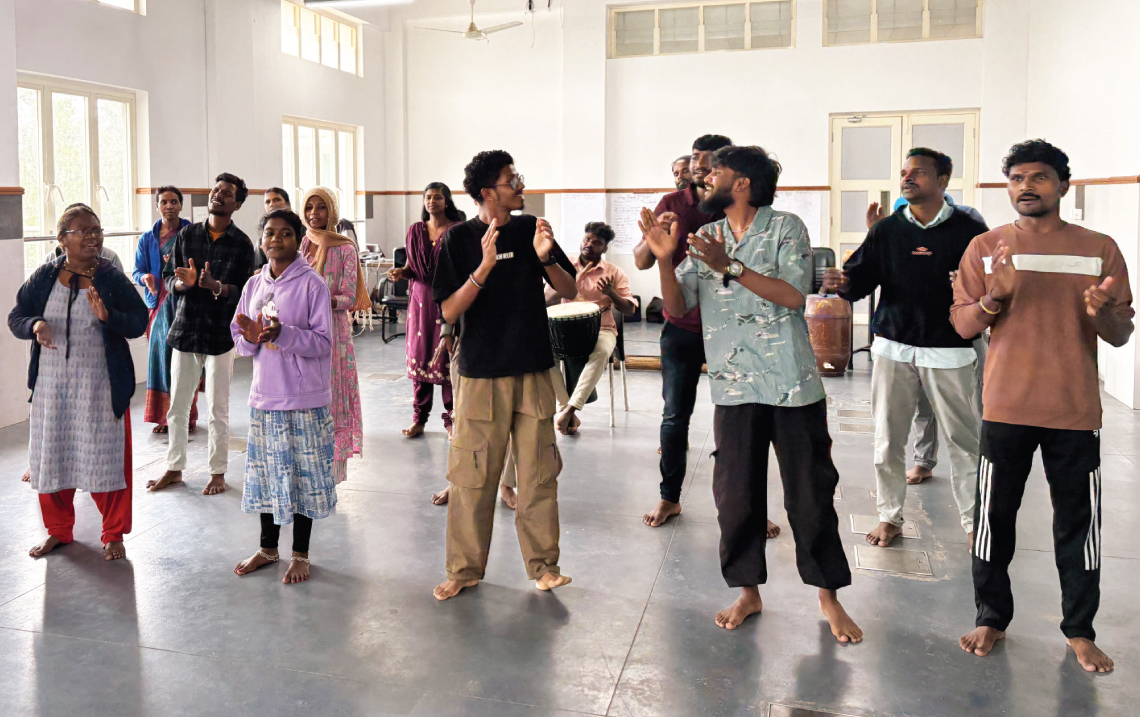
The fellowship will surely contribute to enriching tribal music, which has had its moments in the sun lately. An example is Nanjiyamma, who belongs to the Irula tribal community, winning a national award for the heartwarming Kalakkatha, which she sang and co-wrote for the Malayalam movie Ayyappanum Koshiyum. Yet tribal music and musicians remain largely discounted, reflecting a wider reality for tribal communities, still frequently at odds with the state, its systems and regulations.
ARPO, the force behind the fellowship programme, has played a stellar role in championing the tribal cause in Kerala, home to 37 tribal communities. Since its inception in 2021, the organisation has documented the oral and material history of tribal communities and sought newer avenues to showcase their art and culture.
The genesis of the programme was the interactions that Sruthin Lal, ARPO’s co-founder, had with tribal communities. “I was fascinated by their music and their instruments,” he says. “We had the idea of an initiative in tribal music but we were unsure where to start, and we struggled to raise the necessary resources. Then the Tata Trusts came in with support and things began to fall into order.”
Out with hierarchy
ARPO’s intent with the fellowship has been to create a model shorn of hierarchy, where the tribal musicians involved can express themselves and their talent. “That’s why we don’t have the typical teacher-student relationship, no non-tribal and tribal differentiations, and nobody judging anybody,” adds Mr Lal, himself a trained classical musician.
“Establishing trust [with the tribal musicians] was a challenge,” says Parvathi Asok, ARPO’s co-founder. “We were conscious from the very beginning that we should not in any way be exploiting them. It’s not like we think we are saving them or teaching them to be musicians. We are focused on enabling them to stay rooted in their culture, to be proud of it, to sharpen their skills so that their stories and their traditions are portrayed to the world.”
The sensitivity in the design of the programme follows a similar thread. “We didn’t want the fellows to feel they were being ‘taught’ something; that would have harmed the purpose of the fellowship,” explains Ms Asok. “What we are showing them are the possibilities and the varied music genres out there. We see ourselves as facilitators in a cultural exchange.”
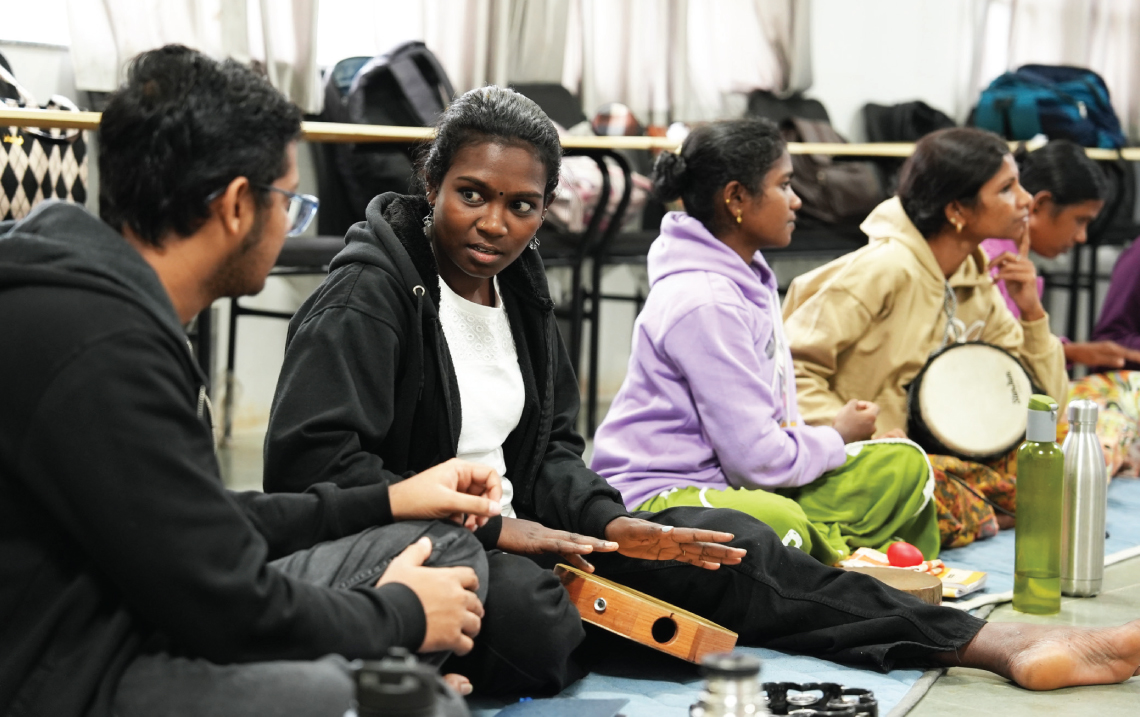
From the Tata Trusts’ perspective, the fellowship aligns with one of the principal objectives of their art and culture portfolio: to support marginalised and underrepresented artists and art forms. “This initiative has been implemented with a lot of care,” says Paroma Sadhana, a programme manager with the Trusts. “The ARPO team has designed a format that relies on open communications between the tribal and non-tribal fellows and the trainers. There’s no top-down teaching here.”
The fellowship is slated to culminate with a musical production themed on the environment and climate change, issues of deep concern to tribal communities. To be staged initially in Kochi — there are plans to take it to other metros as well — the musical will feature nine original compositions by the fellows and a storyline that all of them have contributed to in some measure. It promises to be a blast.
Looking ahead, the fellows can rely on ARPO’s commitment to helping them further their musical careers. “They have the potential as individuals to do well, and even greater potential if they remain a collective,” says Mr Lal. “My vision is for this group to reach a level where we are not needed, to become global ambassadors of their culture and their people.”
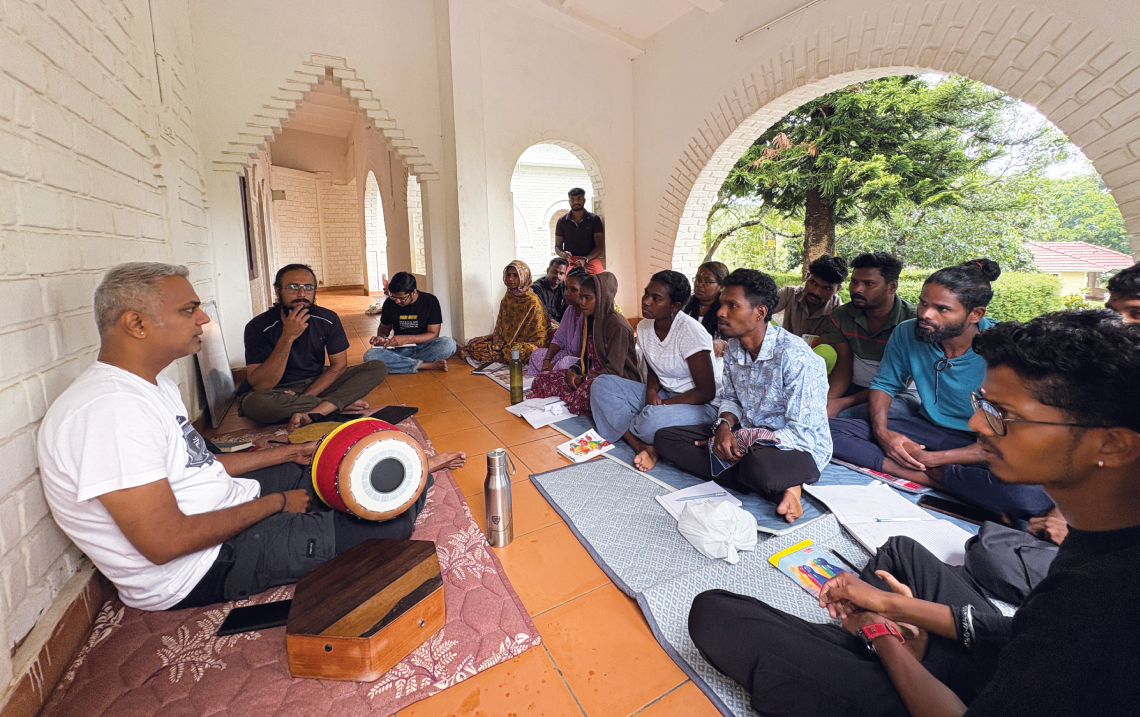
Meanwhile, ARPO has set its mind on carrying the fellowship programme forward, making it a permanent affair that takes in musicians from other tribal communities. Prominent on the organisation’s wish list is an institution with its own infrastructure and space. That would be sweet music, for tribal communities as much as for ARPO.
